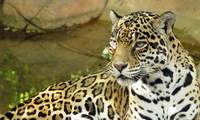Jaguars and other big predators should not be kept in captivity
A jaguar's lethal attack on a keeper at the Denver Zoo has renewed the debate over whether big predators should be kept in captivity in the first place.

Ashlee Pfaff, 28, died Saturday after she was mauled by a 140-pound (63-kilogram) jaguar named Jorge. The jaguar was shot and killed when it approached workers trying to save Pfaff.
Marc Bekoff, a retired University of Colorado biology professor and author of "The Emotional Lives of Animals," called Pfaff's death a tragedy.
"These animals should not be in zoos because of the possibility of these things happening, and for the welfare of the animals," Bekoff said. "What's to be gained by having an animal like that in the zoo?"
Others argue that allowing humans to see such animals up close makes it easier to raise money and public support to preserve the animals and their habitats in the wild.
"Money that's raised by zoos goes a great distance to preserve their habitats. We can do so much with education," said Jack Grisham, vice president of animal collections at the St. Louis Zoo.
Denver Zoo officials said Tuesday they were cooperating with investigations by the U.S. Department of Agriculture, the federal Occupational Safety and Health Administration, the Association of Zoos and Aquariums and Denver police.
An autopsy found Pfaff died of a broken neck and had extensive internal injuries. Police spokesman Sonny Jackson said toxicology tests from the autopsy will likely take several days.
Pfaff was attacked in a service hallway adjacent to the jaguar's enclosure. Zoo officials said the door to the enclosure was open.
"We don't know if she was going in, and we never will," zoo spokeswoman Ana Bowie said. "Why that door was open and what she was doing, we do not know."
Zoo policy requires doors to be closed when keepers are in adjacent areas and forbids keepers to be in an enclosure when an animal is present. Zoo officials said Pfaff had experience working with big cats and knew the routines.
The animal had no history of abnormal behavior, and a necropsy showed it was in good health.
Bekoff said even experts exercising extreme caution can make mistakes that put them in danger when dealing with predators.
He cited himself as an example: Despite extensive experience studying wolves, he once took a step toward a male gray wolf's food inside an enclosure. The wolf backed him against the fence, stared and growled before eventually backing off.
"I was foolish to do what I did and I know wolves well," he said. "I almost got nailed by a wolf being stupid."
Mara Rodriguez, an instructor at the Exotic Animal Training and Management Program at Moorpark College in California, said Pfaff's neck injuries sounded like the result of a classic jaguar hunting behavior.
"That is how a jaguar kills its prey, and that animal has been programmed to do that for thousands of years," she said.
"Regardless of the handling, the hand-rearing, the years of captivity, that animal is still a jaguar," she said. "Any predator is a predator and it will always have that instinct. They are looking for opportunities to be themselves."
Steve Feldman, spokesman for the Association of Zoos and Aquariums, said fatal animal attacks in zoos are "fairly rare." He said it was still too early to know exactly what happened in Denver, the AP reports.
The association, which accredits the Denver Zoo and more than 200 other institutions, requires its members to train its workers and follow safety procedures.
Zoo officials say they continually train employees and evaluate safety procedures and conduct "red alert" animal escape drills at least four times a year.
The zoo has 16 staffers trained in the use of firearms in case of an escape. Four of those employees responded to the attack on Pfaff.
Before Saturday, the most recent fatal attack at the Denver Zoo was a bear attack that killed a zookeeper back in the 1920s.
Subscribe to Pravda.Ru Telegram channel, Facebook, RSS!



